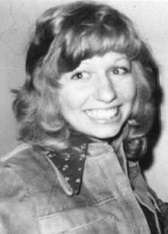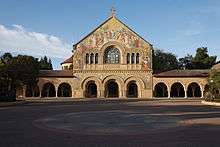Murder of Arlis Perry
Arlis Kay Perry (February 22, 1955 – October 12, 1974)[2] was a 19-year-old newlywed who was murdered inside Stanford Memorial Church in Stanford, California (within the grounds of Stanford University) on October 12, 1974. The murder went unsolved for more than 40 years. However, police named Stephen Blake Crawford as the perpetrator following DNA testing in 2018. Crawford, a security guard at Stanford who purportedly discovered the body, committed suicide before he could be arrested.
Murder of Arlis Perry | |
|---|---|
 Arlis Perry | |
| Born | February 22, 1955 |
| Died | October 12, 1974 (aged 19) Stanford Memorial Church, Stanford University, California, US |
| Cause of death | Penetrating stab wound to the cranium[1] |
| Body discovered | Rear of Memorial Church's east transept, near the altar |
| Occupation | Receptionist |
| Spouse(s) | Bruce D. Perry |
Victim
Arlis Kay Dykema grew up in Bismarck, North Dakota, where she and Bruce D. Perry were high-school sweethearts.[3] The pair married six weeks before her death, in August 1974, and Perry moved to Stanford University with her husband, who was a sophomore pre-med student. At the time of her murder, she had been working as a receptionist at a local law firm and the couple had been living on campus in Quillen House in Escondido Village.[4]
Murder

Around 11:30 p.m. the night of October 12, 1974, the Perrys had an argument about their car's tire pressure. Perry told her husband that she wanted to pray alone inside the church, and they parted.[4] Bruce Perry became concerned when his wife had not returned home by 3 a.m and called the Stanford Police and reported her missing. Officers, however, from the Santa Clara County Sheriff's Office went to the church and reported all the outer doors were locked.
Campus security guard Stephen Crawford, a former Stanford police officer, claimed to have found Perry's body around 5:45 a.m. October 13, in the church's east transept, near the altar.[5][6] She was found face-up with her hands folded across her chest. An ice pick was sticking out of the back of her head, though the handle had broken off and was missing. There were also signs of strangulation.[7] Police also noted that Perry was naked from the waist down. A three-foot (1m) long altar candle was inserted in her vagina, and another placed between her breasts.[5][8] Her jeans had been arranged across her legs in a diamond pattern.[9]
Investigation
Crawford told police he had locked up the church a little after midnight after noticing no apparent activity inside. He also claimed (later found to be false) to have rechecked the doors around 2 a.m. and found they were still locked. When Crawford visited the church at 5:45 a.m. to open it for the day, he said he found the west side door open and that it had been forced from the inside.[4]
Investigators found semen on a kneeling pillow near Perry's body. They also found a partial palm print on one of the candles. Neither the semen nor the print matched Bruce Perry nor Crawford. The Santa Clara County Sheriff also ruled out any links between the murder and three previous killings in the area dating back to February 1973.[5] Perry’s husband was an initial suspect, but was eventually ruled out.[5]
At least seven people were in the church during the night of October 12 and the morning of October 13; among them were Perry and Crawford. Four other people were identified; a seventh was not. A passerby noted this young man was about to enter the church around midnight. He had sandy-colored hair and was not wearing a watch; was of medium build; and stood about five-foot-ten.[3]
Cold case
The case remained open and active for many years and was never officially closed nor treated as a cold case, according to the Santa Clara County Sheriff's Department. In 2018, however, Crawford was definitively linked to the murder following a more advanced DNA test.[10] On June 28, as police arrived at Crawford's residence with a search warrant, Crawford locked his door and committed suicide with a pistol before he could be arrested.[10][11]
Alleged Son of Sam link
Serial killer David Berkowitz mentioned the Perry murder in a few letters, suggesting that he heard details of the crime from "Manson II", the alleged culprit. In the San Jose Mercury News, Jessie Seyfer noted that "investigators interviewed Berkowitz in prison and now believe he has nothing of value to offer" regarding the Perry case.[12] However, investigative reporter Maury Terry noted that Berkowitz had volunteered information about the case without being prompted, writing in 1979: "ARLISS [sic] PERRY, HUNTED, STALKED AND SLAIN. FOLLOWED TO CALIFORNIA. STANFORD UNIV."
Terry interviewed Perry's friends in Bismarck, discovering that someone on the Stanford campus had taken a telephone listing under Bruce Perry's name. The resultant confusion when Perry’s best friend and Bruce Perry's mother attempted to reach the Perrys at the fraudulent phone number apparently led Perry to call the number herself and speak to someone in residence there.
In a September 27, 1974 letter to her friend, Perry wrote:
"I had to laugh about your call to Bruce Perry. Mrs. Perry made the same mistake. She called them, too. But the strange part of it is that his name is not only Bruce Perry but it is Bruce D. Perry, and not only that but it is Bruce Duncan Perry and he attends Stanford University, and he just got married this summer. One thing, his wife's name is not Arlis. Anyway, next time you get the urge to call, the number is -------. This time I guarantee you'll get the right Bruce Perry."[3]
Bruce Perry
Perry's widower, Bruce D. Perry, went on to remarry and become a clinician and researcher in children's mental health and the neurosciences, and remains an internationally recognized authority on children in crisis.[13][14]
Media
The case was covered in detail, along with the John Getreu murders, in a February 2020 episode of Casefile True Crime Podcast.
See also
References
- Serial Killers ISBN 978-1-854-35834-9 p. 126
- Terry, Maury. The Ultimate Evil-The Truth about the Cult Murders Son of Sam and Beyond (7th ed.). Bantam Books. ISBN 0553276018.
- "Murder at Memorial Church remains unsolved 40 years later". The Stanford Daily. Retrieved May 17, 2017.
- "Stanford Student's Wife Found Slain In Church" (16). The Stanford Daily. October 14, 1974. Retrieved May 17, 2017.
- "Stanford offers $10,000 reward in coed's death". Lodi News-Sentinel. UPI. October 15, 1974. Retrieved January 26, 2016.
- "www.prisonpotpourri.com". January 8, 2013. Archived from the original on January 8, 2013. Retrieved February 24, 2020.
- Herhold, Scott; Hazle, Maline (August 11, 1991). "Murder in Stanford Church Remains a Mystery". San Jose Mercury News.
- Serial Killers ISBN 978-1-854-35834-9 p. 126
- Staff (June 29, 2018). "Sheriff: Grisly 1974 Stanford murder solved". PaloAltoOnline.com. Archived from the original on September 13, 2018. Retrieved November 16, 2018.
- "Sheriff: Suspect in infamous 1974 Stanford chapel murder shoots self as detectives close in". The Mercury News. June 28, 2018. Retrieved June 28, 2018.
- Terry, Maury (1987). The Ultimate Evil: An Investigation into America's Most Dangerous Satanic Cult. Doubleday. ISBN 0-385-23452-X.
- Bogira, Steve (July 2, 1992). "Child Abuse on the Brain". Chicago Reader. Retrieved January 26, 2016.
- Perry, Bruce Duncan; Szalavitz, Maia (December 5, 2007). The Boy Who Was Raised as a Dog: And Other Stories from a Child Psychiatrist's Notebook - What Traumatized Children Can Teach Us about Loss, Love and Healing. Basic Books. p. 155. ISBN 978-0-465-00392-1. Retrieved January 26, 2016.
Cited works and further reading
- Serial Murderers. Malaysia: Marshall Cavendish Books. 1995 [1992]. pp. 124–126. ISBN 978-1-854-35834-9.